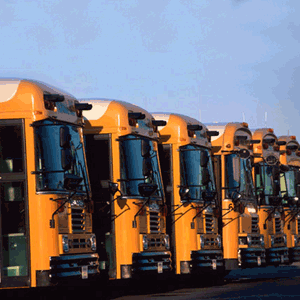Buses, maintenance vehicles using biodiesel blends

October 1, 2004
The number of transportation and maintenance fleets using biodiesel blends continues to rise. Biodiesel Magazine caught up with a handful of these fleets recently. Here's what we found:
Penn State University's College of Agricultural Sciences converted all of its farm vehicles to B20 over the summer. The school uses about 100,000 gallons of fuel annually in 200 pieces of equipment. Export Fuel Co. in Export, Pa., supplies the fuel. Glen Cauffman, manager of farm operations and facilities, said that eventually all of the university's diesel vehicles would use biodiesel. He's seen no problems with the B20.
In Illinois, several more school districts received funding from the Illinois Clean School Bus Program. School districts in Galva, Clinton, Eureka and Fieldcrest are turning to biodiesel blends-mainly B20.
The Chatham County school system in Moncure, N.C., is running its entire fleet of buses on B20. Durham County was the first in the state to use biodiesel in its buses.
Monroe County Community School Corp. became the first fleet in central Indiana to use B20 in its entire fleet of 107 buses.
The majority of vehicles in the Cambridge, Mass., city fleet have switched to B20 after a two-year pilot project.
All buses in east Jefferson County, Wash., are using B20 after Jefferson Transit officials made the switch July 13. The state-funded Olympic Region Clean Air Agency in Olympia gave Jefferson Transit $7,500 to help offset the cost of the fuel.
Penn State University's College of Agricultural Sciences converted all of its farm vehicles to B20 over the summer. The school uses about 100,000 gallons of fuel annually in 200 pieces of equipment. Export Fuel Co. in Export, Pa., supplies the fuel. Glen Cauffman, manager of farm operations and facilities, said that eventually all of the university's diesel vehicles would use biodiesel. He's seen no problems with the B20.
In Illinois, several more school districts received funding from the Illinois Clean School Bus Program. School districts in Galva, Clinton, Eureka and Fieldcrest are turning to biodiesel blends-mainly B20.
The Chatham County school system in Moncure, N.C., is running its entire fleet of buses on B20. Durham County was the first in the state to use biodiesel in its buses.
Monroe County Community School Corp. became the first fleet in central Indiana to use B20 in its entire fleet of 107 buses.
The majority of vehicles in the Cambridge, Mass., city fleet have switched to B20 after a two-year pilot project.
All buses in east Jefferson County, Wash., are using B20 after Jefferson Transit officials made the switch July 13. The state-funded Olympic Region Clean Air Agency in Olympia gave Jefferson Transit $7,500 to help offset the cost of the fuel.
Advertisement
Advertisement
Advertisement
Advertisement
Upcoming Events





